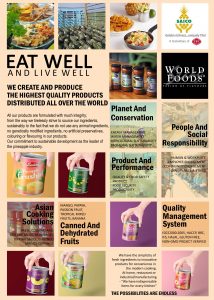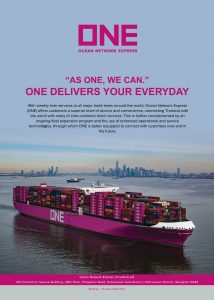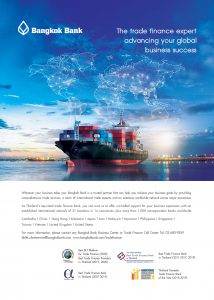The Background and the Major Achievements of The THAI NATIONAL SHIPPERS’ COUNCIL
“การส่งออก” เป็นตัวจักรสำคัญในการขับเคลื่อนการเจริญเติบโตทางเศรษฐกิจของประเทศไทย โดยมูลค่าการส่งออกของประเทศไทยคิดเป็นร้อยละ 65 ของผลิตภัณฑ์มวลรวมภายในประเทศ (GDP) โดยการส่งออกร้อยละ 80–90 เป็นการส่งออกทางเรือ ซึ่งต้องพึ่งพาอาศัยบริการของสายเรือของต่างประเทศทั้งสิ้น ถึงแม้ว่าในปัจจุบันจะไม่มีชมรมสายเรือ แต่การรวมกลุ่มของสายเรือในช่วงหลายปี ที่ผ่านมาก็เป็นสิ่งที่ต้องติดตามถึงผลกระทบที่จะเกิดขึ้นกับภาคการส่งออกและผู้ส่งออกไทย
ด้วยเจตนารมณ์และวิสัยทัศน์ของผู้บริหารระทรวงพาณิชย์และผู้ประกอบการส่งออกไทยในอดีตที่เล็งเห็นความสำคัญและความจำเป็นของการมีองค์กรตัวแทนของผู้ส่งออกไทย จึงได้ผลักดันและเสนอพระราชบัญญัติสภาผู้ส่งสินค้าทางเรือแห่งประเทศไทยและผ่านความเห็นชอบพระราชบัญญัติสภาผู้ส่งสินค้าทางเรือแห่งประเทศไทย พ.ศ.2537 เพื่อเป็นองค์กรตัวแทนของผู้ส่งออก ภายใต้การกำกับดูแลของกระทรวงพาณิชย์ มีบทบาทหน้าที่ในการส่งเสริมและคุ้มครองผลประโยชน์ของสมาชิก ให้คำปรึกษา และเจรจาต่อรองกับผู้ขนส่งสินค้าทางเรือ รวมทั้งหน่วยงานของรัฐและเอกชนที่เกี่ยวข้องกับการขนส่งสินค้าทางเรือ ในเรื่องอัตราค่าระวาง ค่าบริการ ค่าใช้จ่าย ข้อกำหนด หรือเงื่อนไขต่างๆ ในการขนส่งสินค้าทางเรือ
“แลกเปลี่ยนเรียนรู้ กำหนดทิศทาง สร้างอำนาจต่อรอง ปกป้องและคุ้มครองผลประโยชน์ของผู้ส่งออกไทย”
ในช่วงระยะเริ่มต้น สภาผู้ส่งสินค้าทางเรือแห่งประเทศไทย (สรท.) ได้เข้าร่วมประชุมหารือกับสภาผู้ส่งสินค้าทางเรือทั่วโลก (Shippers’ Meeting) เพื่อแลกเปลี่ยนข้อคิดเห็นเกี่ยวกับข้อมูลข่าวสาร และกฎระเบียบต่างๆ กับสภาผู้ส่งสินค้าทางเรือของประเทศต่างๆ ทั่วโลก (Shippers’ Council) โดยในปี 2538 สรท. ได้เข้าร่วมประชุมกับสหพันธ์สภาผู้ส่งสินค้าทางเรือแห่งอาเซียน (Federation of ASEAN Shippers’ Councils-FASC) เป็นครั้งแรก และในปี 2539 สรท. ได้รับเป็นเจ้าภาพ จัดประชุม FASC ครั้งที่ 19 ณ กรุงเทพมหานคร ซึ่งการประชุมครั้งดังกล่าว ได้แต่งตั้งให้นายวิจารณ์ นิวาตวงศ์ ประธานผู้ส่งสินค้าทางเรือแห่งประเทศไทย ในขณะนั้นดำรงตำแหน่งประธานสหพันธ์สภาผู้ส่งสินค้าทางเรือแห่งอาเซียนด้วย นอกจากการเข้าร่วมประชุม FSAC แล้ว สรท. ยังได้เข้าร่วมการประชุมอื่นๆ ทั้งในรูปแบบทวิภาคี พหุภาคี ระดับภูมิภาคและระดับโลกมาอย่างต่อเนื่อง เช่น Tripartite Shippers’ Meeting, Asian Shippers’ Meeting, Global Shippers’ Forum, Asian Shippers’ Alliance (ASA), Global Shippers’ Alliance (GSA)
โดยประเด็นสำคัญที่เร่งผลักดันและดำเนินการอย่างเร่งด่วน คือ การแก้ไขปัญหาด้านการส่งออก–นำเข้า โดยเฉพาะอย่างยิ่งการเจรจาต่อรองกับบริษัทสายเรือและชมรมเรือที่ได้มีการรวมตัวกันและใช้มาตรการต่างๆ ที่ไม่เป็นธรรมกับผู้ส่งสินค้า เช่น การเรียกเก็บค่าภาระหน้าท่า (Terminal Handing Charge: THC) ของสายเรือที่ไม่เป็นธรรม สภาผู้ส่งสินค้าทางเรือแห่งประเทศไทยได้เชิญผู้แทนจากภาครัฐที่รับผิดชอบและสายเรือเข้าร่วมหารือในเรื่องดังกล่าว โดยได้ข้อสรุปว่าค่าภาระหน้าท่าของไทยอยู่ที่ 2,600 บาทต่อตู้ 20 ฟุต และ 3,900 บาทต่อตู้ 40 ฟุต ทำให้ประเทศไทยมีการเรียกเก็บค่าภาระหน้าท่าต่ำกว่าหลายๆ ประเทศ เช่น ญี่ปุ่น สิงคโปร์ ฮ่องกง เป็นต้น ซึ่งช่วยลดภาระต้นทุนค่าใช้จ่ายและสร้างความ
ได้เปรียบในการแข่งขันให้กับผู้ส่งออกไทยในช่วงเวลานั้น
สรท. ยังได้ให้บริการ Service Contract ให้กับสมาชิก โดยได้ดำเนินการเจรจาต่อรองอัตราค่าขนส่งสินค้ากับบริษัทสายเดินเรือในเส้นทางสายหลัก 3 เส้นทาง ได้แก่ ไทย-สหรัฐอเมริกา, ไทย-ญี่ปุ่น, ไทย-ยุโรป/เมดิเตอร์เรเนียน และ สามารถบรรจุผลสำเร็จในการเจรจาตกลงค่าระวางเรือขนส่งสินค้าในเส้นทาง ดังกล่าวกับบริษัท COSCO ในอัตราที่ต่ำมากกว่าอัตราตลาด และเป็นอัตราที่ไม่ได้มีการเรียกเก็บค่า Surcharges อื่นๆ แต่อย่างใด รวมถึง สรท. ยังดำเนินการจัดกลุ่ม ผู้ส่งสินค้าทางเรือตามประเภทสินค้าส่งออก และเชิญประชุมหารือร่วมกันในการ รวบรวมปริมาณความต้องการตู้สินค้า เพื่อต่อรองอัตราค่าระวางกับสายเดินเรือ ในเส้นทางต่างๆ อีกด้วย สำหรับการทำ Service Contract โดยเฉพาะเส้นทาง ไทย-สหรัฐอเมริกากับบริษัท COSCO ได้ดำเนินการอย่างต่อเนื่องมาตั้งแต่ปี พ.ศ. 2539 และยังได้เริ่มทำ Service Contract ในเส้นทางไทย-สหรัฐอเมริกา แบบ All-in Rate กับบริษัท China Shipping ตั้งแต่ในปี พ.ศ. 2544 นอกจากนี้ยังได้เจรจาให้สองบริษัทดังกล่าวนำเรือแม่เข้าเทียบท่าที่ท่าเรือแหลมฉบัง เพื่อลดระยะ เวลาและค่าใช้จ่ายในการถ่ายลำสินค้า (Transshipment) ที่ท่าเรือในฮ่องกงอีกด้วย
นอกจากนี้ สรท. ยังได้มีการประสานงานและแก้ไขปัญหาอย่างใกล้ชิดกับหน่วยงานภาครัฐที่เกี่ยวข้องกับการส่งออก–นำเข้า เช่น กรมศุลกากร กระทรวงการคลังกระทรวงพาณิชย์ เพื่อยกเลิกหรือแก้ไขกฎระเบียบที่ล้าสมัยตลอดจนปรับปรุงพิธีการหรือกระบวนการในการส่งสินค้าออกของกรมศุลกากรให้กระชับเพื่ออำนวยความสะดวกในการส่งออกให้รวดเร็วและมีประสิทธิภาพ
“จากองค์กรตัวแทนผู้ส่งออกสู่ศูนย์กลางองค์ความรู้และการพัฒนาด้านโลจิสติกส์”
จากบทบาทหน้าที่ในฐานะองค์กรตัวแทนผู้ส่งออก ในการปกป้องและคุ้มครองผลประโยชน์ของสมาชิกและการเป็นศูนย์กลางในการแก้ไขปัญหาที่เกี่ยวข้องกับการส่งออก–นำเข้า สภาผู้ส่งสินค้าทางเรือแห่งประเทศไทย ได้ริเริ่มนำแนวคิดในเรื่องของการบริหารจัดการโลจิสติกส์และโซ่อุปทาน เพื่อลดต้นทุนขององค์กรและเพิ่มขีดความสามารถในการแข่งขันของผู้ประกอบการไทยในเวทีการค้าโลก
สภาผู้ส่งสินค้าทางเรือแห่งประเทศไทย จึงได้มีการปรับเปลี่ยนวิสัยทัศน์และทิศทางกาดำเนินงานไปสู่ “การเน้นการเพิ่มขีดความสามารถในการแข่งขันของผู้ส่งออกด้วยการพัฒนาระบบการบริหารจัดการโลจิสติกส์และโซ่อุปทาน” ในขณะนั้น คำว่า “โลจิสติกส์” ถือว่าเป็นเรื่องใหม่มากสำหรับประเทศไทย หน่วยงานภาครัฐและภาคเอกชน รวมทั้งผู้ประกอบการยังไม่มีความเข้าใจเรื่องการ บริการจัดการโลจิสติกส์และโซ่อุปทาน สภาผู้ส่งสินค้าทางเรือแห่งประเทศไทย จึงได้ถือเป็นภารกิจหลักสำคัญอีกประการหนึ่ง ในการสร้างความตระหนักและ
การเผยแพร่องค์ความรู้ต่างๆ ที่เกี่ยวข้องกับการบริหารจัดการด้านโลจิสติกส์และห่วงโซ่อุปทานไปยังหน่วยงานภาครัฐและภาคเอกชนที่เกี่ยวข้อง เพื่อให้เล็งเห็นความสำคัญของการขับเคลื่อนเศรษฐกิจของประเทศด้วยการบริหารจัดการโลจิสติกส์ที่มีประสิทธิภาพ ซึ่งส่งผลให้เกิดการตื่นตัวในเรื่องของการบริหารจัดการโลจิสติกส์ในวงกว้าง จนทำให้มีการบรรจุเรื่องการพัฒนาโลจิสติกส์เข้าในวาระของคณะกรรมการพัฒนาขีดความสามารถในการแข่งขันของประเทศ (กพข.) ซึ่งมีนายกรัฐมนตรีเป็นประธาน และมีการจัดทำแผนยุทธศาสตร์การพัฒนาระบบโลจิสติกส์เป็นครั้งแรกในประเทศไทย เมื่อปี 2548 รวมทั้งการพัฒนาโลจิสติกส์ได้ถูกบรรจุเป็นวาระแห่งชาติอีกด้วย
จากการดำเนินงานในเรื่องของการพัฒนาระบบการบริหารจัดการโลจิสติกส์ และโซ่อุปทานมาอย่างต่อเนื่อง สภาผู้ส่งสินค้าทางเรือแห่งประเทศไทย ได้รับมอบหมายให้เป็นผู้รับผิดชอบหลักในการดูแลและพัฒนาบุคลากรทางด้านโลจิสติกส์ร่วมกับ กระทรวงพาณิชย์ ภายใต้คณะกรรมการพัฒนาขีดความสามารถในการแข่งขันของประเทศ (กพข.) และเข้าร่วมเป็นคณะกรรมาธิการ คณะกรรมการและคณะอนุกรรมการต่างๆ ที่เกี่ยวข้องกับการพัฒนาระบบโลจิสติกส์ของทั้งภาครัฐและเอกชนมากกว่า 30 คณะ และได้เข้าไปมีส่วนร่วมในการจัดทำแผนงานต่างๆ ที่เกี่ยวข้องในทุกระดับ
การพัฒนาโลจิสติกส์นั้น ไม่สามารถที่จะดำเนินการพัฒนาได้ด้วยองค์กรหรือหน่วยงานใดเพียงลำพัง ดังนั้น สภาผู้ส่งสินค้าทางเรือแห่งประเทศไทย จึงเป็นแกนนำในการรวมภาคเอกชนที่เกี่ยวข้องทางด้านโลจิสติกส์ จำนวน 17 องค์กร จัดตั้งสมาพันธ์โลจิสติกส์ไทย (Thai Federation on Logistics: TFL) ซึ่งได้ลงนามในบันทึกความร่วมมือของภาคเอกชนในการพัฒนาระบบโลจิสติกส์ของประเทศ เมื่อวันที่ 15 ธันวาคม 2547 ปัจจุบัน TFL ได้มีการปรับเปลี่ยนจำนวนคณะทำงานชุดต่างๆ ตามภารกิจแต่ละด้านให้เหมาะสมกับสถานการณ์ปัจจุบัน และได้รับเชิญเข้าร่วมประชุมหารือกับหน่วยงานต่างๆ ของภาครัฐ เช่น สภาพัฒน์ฯ กรมศุลกากร กระทรวงคมนาคม กระทรวงพาณิชย์ อย่างต่อเนื่อง
จากภารกิจที่ได้รับมอบหมายในเรื่องของการพัฒนาบุคลากรทางด้านโลจิสติกส์ สภาผู้ส่งสินค้าทางเรือแห่งประเทศไทย จึงได้มีการประสานและสร้างเครือข่ายกับหน่วยงานระหว่างประเทศและสถาบันการศึกษา เพื่อเพิ่มขีดความสามารถในการบริหารจัดการด้านโลจิสติกส์ให้กับสมาชิกและผู้ประกอบการไทย อาทิเช่น Japan External Trade Organization (JETRO Bangkok), Japan Small Business Research Institute (JSBRI), Association for Oversea Technical Scholarship (AOTS), Japan Institute of Logistics System (JILS) และสถาบันการขนส่ง จุฬาลงกรณ์มหาลัย นอกจากนี้ สภาผู้ส่งสินค้าทางเรือแห่งประเทศไทย ยังได้ทำการศึกษาวิจัยต้นทุนโลจิสติกส์สำหรับอุตสาหกรรมส่งออกหลักของไทย เพื่อให้ทราบถึงตัวเลขสัดส่วนต้นทุนโลจิสติกส์ต่อยอดขาย และงานวิจัยอื่นๆ เพื่อใช้เป็นข้อมูลในการพัฒนาระบบโลจิสติกส์ของประเทศอีกด้วย
“มุ่งสู่การเป็นศูนย์กลางองค์ความรู้และการพัฒนาบุคลากร
ด้านโลจิสติกส์”
หลังจากความพยายามอย่างมุ่งมั่นของสภาผู้ส่งสินค้าทางเรือแห่งประเทศไทย ปัจจุบันคำว่า “โลจิสติกส์” ไม่ใช่เรื่องแปลกใหม่สำหรับประเทศไทยอีกต่อไป แต่การจะทำให้ประเทศไทยมีการพัฒนาโลจิสติกส์อย่างมีประสิทธิภาพ และก้าวสู่การเป็นศูนย์กลางด้านโลจิสติกส์ของภูมิภาคอาเซียนนั้น ไม่ใช่เพียงแต่การพัฒนาเฉพาะโครงสร้างพื้นฐานเท่านั้น หากแต่จะต้องพัฒนาระบบสารสนเทศ และพัฒนาบุคลากรไปพร้อมกัน
สภาผู้ส่งสินค้าทางเรือแห่งประเทศไทย ได้ตระหนักและถือเป็นภารกิจหลักในการที่จะพัฒนาบุคลากรทางด้านโลจิสติกส์ของประเทศไทย เพื่อตอบสนองความต้องการของตลาดแรงงานและผู้ประกอบการ ดังนั้น จึงได้มีการจัดสัมมนาและฝึกอบรมหลักสูตรต่างๆ ที่เกี่ยวข้องกับการบริหารจัดการด้านโลจิสติกส์และโซ่อุปทานอย่างต่อเนื่องทั้งหลักสูตรระยะสั้น/ระยะยาว หลักสูตรวุฒิบัตรวิชาชีพ และหลักสูตรความร่วมมือกับองค์กรระหว่างประเทศ เช่น โครงการหลักสูตรวุฒิบัตรวิชาชีพทางด้านโลจิสติกส์และโซ่อุปทานสำหรับผู้บริหารโดยผู้เชี่ยวชาญ
จาก Penn State University, U.S.A., โครงการหลักสูตรประกาศนียบัตรโลจิสติกส์สำหรับผู้บริหารระดับกลาง “Certified Logistics Professional” ภายใต้โครงการ Logistics Qualification System Program: LQSP ใช้หลักสูตรของ JILS และใช้ผู้เชี่ยวชาญจากประเทศญี่ปุ่น เป็นต้น พร้อมทั้งการประสานความร่วมมือกับสถาบันการศึกษา สำนักงานคณะกรรมการการอาชีวศึกษา สำนักงานคณะกรรมการการอุดมศึกษา กระทรวงศึกษาธิการ กรมพัฒนาฝีมือแรงงาน กระทรวงแรงงาน กรมส่งเสริมการค้าระหว่างประเทศ กระทรวงพาณิชย์ กรมอเมริกาและแปซิฟิกใต้ กระทรวงการต่างประเทศ สภาพัฒนาการเศรษฐกิจ
และสังคมแห่งชาติ และกระทรวงอุตสาหกรรม ทั้งในเชิงนโยบาย แผนปฏิบัติงาน มาตรฐานหลักสูตรทางด้านโลจิสติกส์ รวมทั้งแผนพัฒนาบุคลากรทางด้านโลจิสติกส์ของประเทศ
“ติดตามสถานการณ์ สะท้อนประเด็นปัญหาการส่งออก ผลักดันการปฏิรูป
ประเทศไปสู่ชาติการค้า”
สภาผู้ส่งสินค้าทางเรือแห่งประเทศไทย ติดตามประเมินสถานการณ์การส่งออกอย่างใกล้ชิด และแถลงข่าวสถานการณ์การส่งออกเป็นประจำทุกเดือนเพื่อประชาสัมพันธ์ให้สมาชิก สื่อมวลชนและสาธารณชนรับทราบ รวมทั้งสะท้อนข้อมูลไปยังหน่วยงานภาครัฐและภาคเอกชนที่เกี่ยวข้อง พร้อมนำเสนอแนวทางแก้ไขปัญหาและพัฒนาการส่งออกทั้งในระยะสั้นและระยะยาว
และจากวิกฤตการณ์ทางการเมืองในประเทศทำให้การส่งออกที่เป็นกลไกในการขับเคลื่อนเศรษฐกิจของประเทศชะงักงันและตกต่ำอย่างต่อเนื่องหลายปีประกอบกับเศรษฐกิจโลกที่อยู่ในภาวะผันผวนไม่แน่นอน และขีดความสามารถในการแข่งขันทางการค้าของไทยก็มีปัญหา สรท. จึงได้เสนอให้รัฐบาลเข้ามาดูแลการส่งออกอย่างจริงจัง จัดเป็นวาระแห่งชาติ และ ทำแผนยุทธศาสตร์การค้าของชาติที่รวมสินค้าและบริการไว้ด้วยกัน ปฏิรูปชาติไทยให้เป็น “ชาติการค้า (Trading Nation)” ในปี 2557 เพื่อสร้างขีดความสามารถในการแข่งขันในเชิงการค้าของชาติให้เป็นระดับโลก สร้างไทยให้เป็นศูนย์กลางการค้า ศูนย์กลางการลงทุน ศูนย์กลางโลจิสติกส์ ในระดับภูมิภาคและระดับโลก โดยสามารถขยายฐานการผลิต ฐานวัตถุดิบ ฐานการค้า ฐานการกระจายสินค้า ฐานการตลาด ไปยังประเทศเป้าหมาย ด้วยสินค้าเป้าหมาย ที่มีคุณค่าเพิ่ม มีนวัตกรรม และ มีตราสินค้าของตนเอง จากการผลักดันและนำเสนอข้อมูลไปยังหน่วยงานภาครัฐที่เกี่ยวข้องอย่างต่อเนื่อง ทำให้รัฐบาลได้บรรจุนโยบายการพัฒนาประเทศไปสู่ชาติการค้าอยู่ในแผนยุทธศาสตร์การปฏิรูปประเทศ 20 ปี
“มุ่งมั่นสร้างขีดความสามารถในการแข่งขัน ให้ก้าวทันการเปลี่ยนแปลงและเทคโนโลยี เพื่อพลิกโฉมประเทศไทยสู่ชาติการค้า”
ถึงแม้ว่าไทยจะก้าวผ่านวิกฤตทางการเมืองและเข้าสู่ระบอบประชาธิปไตยแต่สถานการณ์เศรษฐกิจโลกในช่วง 2-3 ปีที่ผ่านมาตกอยู่ในภาวะชะลอตัวอย่างต่อเนื่อง สืบเนื่องมาจากปัจจัยภายนอก ได้แก่ สงครามการค้าระหว่างสหรัฐและจีน การแยกตัวออกจาก EU ของสหราชอาณาจักร (Bexit) ความไม่สงบและความขัดแย้งทางการเมืองในหลายประเทศและหลายภูมิภาค การหดตัวทางเศรษฐกิจของประเทศคู่ค้าหลัก และความไม่เชื่อมั่นของผู้บริโภคทั่วโลก รวมถึงความก้าวหน้าทางเทคโนโลยีสารสนเทศที่ส่งผลกระทบต่อการดำเนินธุรกิจ (Digital Disruption) และปัจจัยภายใน ได้แก่ โครงสร้างพื้นฐานและประสิทธิภาพการให้บริการด้านโลจิสติกส์ SMEs ของไทยยังขาดความพร้อมและศักยภาพ ความผันผวนของอัตราแลกเปลี่ยนและการแข็งค่าของเงินบาทอย่างรวดเร็ว เสถียรภาพทางการเมือง
ขาดการบูรณาการงานระหว่างหน่วยงานภายในประเทศ ทำให้ไม่สามารถแก้ไข
ปัญหาได้อย่างมีประสิทธิภาพ และขาดแคลนแรงงานที่มีประสิทธิภาพและมีทักษะที่ดี
สภาผู้ส่งสินค้าทางเรือแห่งประเทศไทย จึงได้เสนอยุทธศาสตร์ส่งเสริมการค้าระหว่างประเทศ โดยร่วมกับสมาชิก กลุ่มอุตสาหกรรม และสมาคมการค้าที่เกี่ยวข้องกับการนำเข้าส่งออก หารือร่วมกันอย่างใกล้ชิดเพื่อติดตามประเด็นปัญหาและข้อเสนอแนะแนวทางการดำเนินงานพร้อมหน่วยงานที่เกี่ยวข้อง และจัดทำเป็นยุทธศาสตร์ส่งเสริมการค้าระหว่างประเทศสำหรับดำเนินงานร่วมกับหน่วยงานภาครัฐและภาคเอกชน และผลักดันโครงการ National Digital Trade Platform: NDTP ของประเทศไทย เพื่อรองรับการเติบโตของพาณิชย์อิเล็กทรอนิกส์และเพิ่มขีดความสามารถในการแข่งขันให้กับประเทศ โดยมีองค์ประกอบคณะทำงาน อาทิ สภาหอการค้าแห่งประเทศไทย สภาอุตสาหกรรมแห่งประเทศไทย สมาคมธนาคารไทย สภาผู้ส่งสินค้าทางเรือแห่งประเทศไทย และสมาคมการค้าที่เกี่ยวข้อง เพื่อยกระดับประเทศไทยให้ก้าวไปสู่ชาติการค้า
ในปี พ.ศ. 2562 สภาผู้ส่งสินค้าทางเรือแห่งประเทศไทย (สรท.) ได้ดำเนินการมาครบ 25 ปี โดยตลอดระยะเวลาที่ผ่านมา สภาผู้ส่งสินค้าทางเรือแห่งประเทศไทยได้พยายามทำหน้าที่ในฐานะองค์กรตัวแทนของผู้ส่งออก ในการปกป้องและคุ้มครองผลประโยชน์ของสมาชิก รวมทั้งการเพิ่มขีดความสามารถในการแข่งขันของผู้ประกอบการไทยผ่านการพัฒนาระบบบริหารจัดการทางด้านโลจิสติกส์และโซ่อุปทาน เพื่อเสริมสร้างศักยภาพและความเข้มแข็งให้กับผู้ส่งออกไทยมาอย่างต่อเนื่อง ภายใต้วิสัยทัศน์ “สรท. เป็นองค์กรของผู้ประกอบการค้าระหว่างประเทศในการสร้างศักยภาพทางการแข่งขันตลอดโซ่คุณค่า เพื่อนำประเทศไปสู่ชาติการค้า”
สภาผู้ส่งสินค้าทางเรือแห่งประเทศไทย ยังคงมุ่งมั่นในการทำหน้าที่ในฐานะองค์กรตัวแทนของผู้ส่งออก และเป็นศูนย์กลางองค์ความรู้ในการพัฒนาบุคลากรทางด้านโลจิสติกส์ของประเทศไทยให้ตอบสนองความต้องการของภาคอุตสาหกรรมด้วยการเชื่อมโยงองค์ความรู้ทางด้านโลจิสติกส์ และ Shippers’ Council จากทั่วโลก รวมถึงยกระดับขีดความสามารถในการแข่งขันของผู้ประกอบการไทยให้มีความพร้อมและก้าวทันกับเทคโนโลยีที่เปลี่ยนแปลงไป ผลักดันการอำนวยความสะดวกทางการค้าให้มีประสิทธิภาพ รวมทั้งพัฒนาศักยภาพของผู้ส่งออกไทยเพื่อให้สามารถแข่งขันและก้าวสู่เวทีโลกอย่างภาคภูมิและยั่งยืน
“Export” is the main mechanism in driving Thailand’s economic growth, Thailand’s export value accounts for 65 percent of GDP and 80-90 percent of goods are exported by marine transportation which entirely depends upon the services of foreign liner. Though at present there is no more carrier conference, the grouping of liner during the past several years should be paid attention on its impact towards export sector and Thai exporter.
With the determination and vision of the high-level management
officials of the Ministry of Commerce and the Thai exporter in the past who deemed it was significant and necessary to have an organization
which represents the Thai exporter, the Thai National Shippers’ Council
Act B. E. 2537 was proposed, approved and enacted, and the Thai National Shippers’ Council was set up to serve as the representative organization of exporter, under the supervision of the Ministry of Commerce. TNSC’s main roles are to promote and protect the interest of member, to provide consultation, to negotiate with liner as well as the public and private agencies relating to marine transportation.
“Knowledge Sharing and Learning, Setting-up Direction, Building-up Bargaining Power and Protecting the Interest of the Thai Exporter”
In the early years of establishment, the Thai National Shippers’ Council (TNSC) participated in Shippers’ Meetings world-wide to
exchange and share views on data, information and related rules and regulations with other Shippers’ Councils. In 1995, the Thai National Shippers’ Council participated in the Federation of ASEAN Shippers’ Council for the first time, and in 1996 TNSC hosted the 19th FASC Meeting in Bangkok, during which Mr. Vijarn Niwatwongs, the then
TNSC’s Chairman, was appointed to serve as FASC’s Chairman. Apart from FASC Meeting, TNSC has continually participated in several meetings both bilateral, multi-lateral, regional and international levels such as Tripartite Shippers’ Meeting, Global Shippers’ Forum, Asian Shippers’ Alliance (ASA), and Global Shippers’ Alliance (GSA).
The important issue which needed to be urgently tackled at that time was to overcome import-export problems especially the negotiation with liner that groups together and applies different unfair measures towards shipper such as the unfair collecting of Terminal Handling Charge: THC by liner, the Thai National Shippers’ Council invited representatives from the concerned government agencies and liner to discuss on the issue. The outcome was that THC in Thailand were at 2,600 baht for 20 feet container and 3900 baht for 40 feet container, this has made THC in Thailand lower than that in many countries such as Japan, Singapore and Hong Kong, etc. TNSC’s effort has helped reduce cost and build up competitive advantage to the Thai exporter at that time.
TNSC has provided Service Contract to the member by negotiating freight rates in the 3 main routes, i.e. Thai-USA, Thai–Japan, Thai-Europe/Mediterranean. TNSC successfully negotiated with COSCO Company at the rates which were much lower than market rates and there was no other surcharges. After that TNSC classified shipper by types of export product and organized meeting to consult on the number of container required to negotiate freight rates in other routes as well. The Service Contract on Thai-USA route with COSCO Company has been continually carried out since 1996, and the Service Contract for all in freight rates with China Shipping Company has been carried out since 2001. Moreover, TNSC negotiated with the two companies to let their mother ship to call on Laem Chabang Port to reduce time and cost for transshipment in Hong Kong.
Besides, TNSC has coordinated closely with the concerned government agencies such as the Customs Department, the Ministry of Commerce, the Ministry of Finance to tackle export-import problems, to cancel or amend the outdate rules and regulations and to adjust the Customs’ export processes and procedures to be more compact to facilitate export to be faster and more effective.
“From Being the Representative of Exporter to the Center of Logistics Knowledge and Development”
Serving as the representative organization of exporter to promote and protect the interest of the member and the center for tackling export-import problems, the Thai National Shippers’ Council has further initiated the concept of logistics and supply chain management to reduce cost and increase competitiveness of the Thai entrepreneur in the global market.
The Thai National Shippers’ Council adjusted her vision and direction towards “Focusing on the Increase of Competitiveness of Exporter through Logistics and Supply Chain Management.” At that time, “logistics” was considered very new to Thailand, both public and private agencies as well as entrepreneur, they did not understand logistics and supply chain management, the Thai National Shippers’ Council made another important step of responsibility in creating awareness and publicizing the knowledge on logistics and supply chain management to all the concerned agencies both public and private sectors to make them realize the significance of driving the country’s economy by logistics management. As a result, alertness on logistics management was created extensively and it was proposed to the National Competitiveness Committee, chaired by the Prime Minster. The First Logistics Development Strategic Plan was drafted in Thailand in 2005 and logistics management was put into the national agenda.
After that, TNSC has continually developed logistics and supply chain management and has been assigned to take responsibility in logistics capacity building by cooperating with the Ministry of Commerce
under the supervision of the National Competitiveness Committee. TNSC sits in over 30 commissions, committees and sub-committees relating to logistics system management of both public and private sectors and also participates in devising related plans in all levels.
The development of logistics cannot be done by any agency alone, the Thai National Shippers’ Council serves as the leading organization in grouping all the private sector organizations relating to logistics which comprise 17 organizations to set up Thai Federation on Logistics: TFL. Memorandum of Understanding of the Private Sector to Develop Logistics was signed on December 15, 2004. At present, TFL has adjusted its working groups according to its missions to suit the situation. TFL has been continually invited to participate in several meetings with the public organizations such as the Customs Department, the Ministry of Transportation and the Ministry of Commerce
According to the assignment in logistics capacity building, the Thai National Shippers’ Council has coordinated and built up network with international organizations and education institutes to increase competitiveness in logistics management of the member and the Thai entrepreneur such as Japan External Trade Organization (JETRO Bangkok), Japan Small Business Research Institute (JSBRI), Association for Oversea Technical Scholarship (AOTS), Japan Institute of Logistics System (JILS) and Transportation Institute, Chulalongkorn University. Moreover, the Thai National Shippers’ Council conducted study research on logistics cost per sell of the main export products and other study researches to be used as the data for the country’s logistics system development.
“Aiming towards Logistics Knowledge and Capacity Building Center”
After the persistent efforts, the Thai National Shippers’ Council, today, the word “logistics” is no longer strange in Thailand, but to build up effective logistics development in Thailand and to move forward to become ASEAN logistics center, it needs not only the development of infrastructure but it also needs advance information technology system and human resources development at the same time.
The Thai National Shippers’ Council is well aware of this issue and has made it as her main responsibility to develop human resources in logistics in Thailand to respond to the requirement of labor market and entrepreneur. Many seminar and training courses on logistics and supply chain management have been organized both short and long courses, certified professional courses and the courses which received cooperation from international organizations such as “Certified Logistics Professional” by Penn State University USA, “Logistics Qualification System Program; LQSP” by Japan Institutes of Logistics System (JILS) which uses Japanese resource persons etc. In addition, TNSC has cooperated with all concerned agencies both in terms of policy and operational plan on logistics standard
curriculum and the national human resources development plan. The
cooperation agencies are such as educational institutes, Office of the Vocational Education Commission, the Office of Higher Education,
under the Ministry of Education, Department of Skill Development
under the Ministry of Labor, the International Trade Promotion Department under the Ministry of Commerce, the Department of American and South-Pacific Affairs under the Ministry of Foreign Affairs, the Office of the National Socio-Economic Development Board and the Ministry of Industry.
“Following-up Situation to Reflect Export Problems and Driving the Country’s Reform to Become Trading Nation”
The Thai National Shippers’ Council has closely followed up and assessed export situation and has organized press conference on export situation on monthly basis to publicize the real situation to the member, the media and the public and to reflect the data to the concerned agencies both public and private sectors as well as to propose guidelines to tackle the problems and to improve export situation both in short and long terms.
The internal political crisis has made export, which is the country’s main mechanism in driving economic growth, to become stagnant and to continually slump for several years. This is in couple with the fluctuation and uncertainty of the global economy, as well as the problem of the country’s trade competition, TNSC proposed the government to pay close attention to the country’s export by putting the issue into the national agenda and to devise the country’s trading strategy for both products and services to reform the country into “Trading Nation” in 2013, to build up the national trade competitiveness to be at the global level; to build up Thailand
to become trading center, investment center, logistics center at regional
and global levels by enabling to expand production base, raw material
base, trading base, distribution base and marketing base to the target
country with the target product which have more value-added,
innovation and their own brands. With the persistent driving of TNSC by proposing related data to the concerned agencies continually, the government has put this issue into the national development plan towards the Trading Nation in the 20 Year National Reform Strategic Plan.
“Determining to Build-up Competitiveness to Catch-up with Change and Technology to Turn Thailand into Trading Nation”
Although Thailand has passed through political crisis and entered democracy system, the global economy during the past 2-3 years has been continually slowdown due to both internal and external factors i.e. the trade war between the USA and China, the withdrawal of Britain from the EU or Brexit, the unrest and political conflict in many countries and regions, the economic contraction of the major trading partners, the lack of confidence of consumer world-wide and the advancement of IT which causes Digital Disruption. The internal factors are infrastructure and logistics services, the Thai SMEs still lack of readiness and potential, the fluctuation of exchange rates and the quick appreciation of baht, political stability, the lack of integration among the internal government agencies leading to the ineffectiveness in problems solving and the shortage of capable and skillful labor.
The Thai National Shippers’ Council has proposed the Strategy
on International Trade Development, by cooperating with member,
industry groups and trading associations related to export and import to
closely follow up issues and problems and prepare the recommendations
and identify the responsible agencies and put into the Strategy on International Trade Development. The plan should be carried out by both public and private sectors. TNSC also drives for Thailand’s National Digital Trade Platform; NDTP to support the growth of e-commerce and to increase the country’s competitiveness. The working group comprises the Board of Trade of Thailand, the Thai Federation Industry, the Thai Bankers’ Association, the Thai National Shippers’ Council and related trade associations. Its objective is to develop the country to become Trading Nation.
In 2019, the Thai National Shippers’ Council (TNSC) has celebrated her 25th anniversary, throughout the past years, the Thai National Shippers’ Council has tried her best to serve as the representative organization of exporter to promote and protect the interest of member, to increase competitiveness of the Thai entrepreneur through logistics and supply chain management to continually enhance the potential and strength of the Thai exporter. All the endeavors has been carried out under the vision of “TNSC is an Organization of International Trader, which Aims to Build-up Competitive Potential throughout Value Chain to Turn the Country into Trading Nation”
The Thai National Shippers’ Council still determines to carry out her roles as the representative organization of exporter and Thailand’s logistics knowledge and capacity building center to meet the need of the industrial sector by connecting logistics knowledge and Shippers’ Councils world-wide, enhancing competitiveness of the Thai entrepreneur to be ready and catch up with the changing technology, driving for trade facilitation and developing the potential of the Thai exporter to be able to compete in the global market with pride and sustainability.




